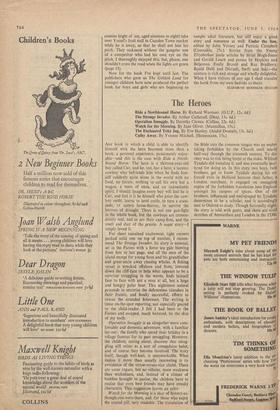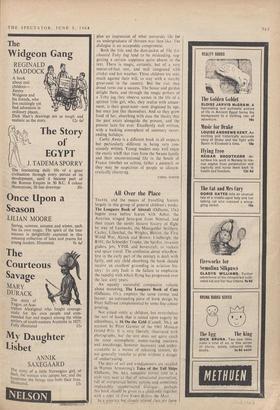The Heroes
ANY book in which a child is able to identify himself with the hero becomes more than a book, a personal experience, passionately enjoy- able—and this is the case with Ride a North- bound Horse. The hero is a thirteen-year-old boy called Cav, and he, too, has a hero, a laconic cowboy who befriends him when he finds him- self suddenly quite alone in the world with no food, no future, nothing to call his own but a wagon, a team of oxen, and an indomitable spirit. I should imagine every boy will feel he is Cav, and feel it is he himself who joins the cow- boy outfit, learns to herd cattle, to turn a stam- pede, to outwit horse-thieves, to survive the horrors of drought. There is not one gun-fight in the whole book, but the cowboys are tremen- dously real, and so are their camp-fires, and the smell and dust of the prairie. A super story—I simply loved it.
For sheer sustained excitement, tight corners packed solid one on top of another, I recom- mend The Strange Invader. Its story is unusual, set in the Faroes with a force ten gale blowing from first to last page, and all the men of the island except for young Sven and his grandfather and great-uncle away chasing whales. A fishing vessel is wrecked offshore and Sven, lowered down the cliff-face to help what appears to be a survivor struggling in the waves, finds himself face to face with not a man at all, but a huge and hungry polar bear. This nightmare animal proceeds.to terrorise the defenceless islanders in their frantic, and finally successful, efforts to rescue the stranded fishermen. The writing is tense on-the-spot reporting, not especially geared to the child-reader. I felt I had been to the Faroes and escaped, much battered, by the skin of my teeth.
Operation Smuggle is an altogether more com- fortable and domestic adventure, with a familiar lay-out : the family who spend their holiday in a village famous for its past smuggling. However, the children, nosing about, discover that smug- gling still exists as a sort of cornwilsive habit, and of course they become involved. The story itself, though well-knit, is unremarkable. What makes it more than usually interesting is its avoidance of the virtue-versus-vice cliché. There are some rogues, but no villains, more weakness than wickedness, and, instead of a climax of baddies brought to justice, the children have to realise that even best friends may have streaky characters. This suggestion leaves an echo.
Watch for the Morning is a slice of history-as- though-you-were-there, and, for those who enjoy the coated pill, very readable. The translation of the Bible into the common tongue was an under- taking forbidden by the Church until nearly half-way through the sixteenth century. To dis- obey was to risk being burnt at the stake. William Tyndale did translate it, and was eventually mar- tyred for doing so. In this story two boys, twin brothers, get to know Tyndale during his en- forced exile in Holland because their father. a London merchant, is engaged on smuggling copies of the forbidden translation into England amongst his cargoes of spices. One of the brothers, influenced and encouraged by Tyndale, determines to be a scholar, and is accordingly sent to Oxford to study. Though fictionally slight, the story is told with gusto, and there are vivid sketches of Amsterdam and London in the 15305,
plus an impression of what university life for an undergraduate of thirteen was then like. The dialogue is an acceptable compromise.
Both the title and the dust-jacket of The En- chanted Toby Jug tend to be misleading, sug- gesting a certain soppiness quite absent in the text. There is magic, certainly, but of a very matter-of-fact sort, and well integrated with cricket and hot weather. Three children are sent, much against their will, to stay with a starchy great-aunt in the country. But the visit they dread turns out a success. The house and garden delight them, and through the magic po4vers of a Toby jug they observe scenes in the life of a spirited little girl, who, they realise with amaze- ment, is their great-aunt—now disguised by age, but once just like themselves. And so they grow fond of her, absorbing with ease the theory that the past exists alongside the present, and the present lasts for ever. Excellently well written, with a basking atmosphere of summery never- ending holidays.
Cathy Away is a different book in all respects but particularly different in being very con- sciously written. Young readers may well enjoy the exotic whiff that rises from the Swann family and their unconventional life in the South of France (mother an actress, father a painter); or they may be suspicious of people so idiosyn- cratically charming.
EMMA smiiit







































 Previous page
Previous page